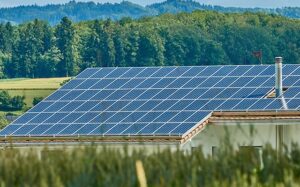Solar panels are an increasingly popular way to reduce energy costs and help protect the environment. With more people looking for ways to conserve energy, solar panel systems are becoming a viable option for many households and businesses.
This guide will explore the benefits of using solar panels, as well as how they work, what they cost, and other important information you should consider before taking the plunge into solar power.
By learning about the advantages of solar energy, you can make an informed decision about whether or not it is right for you. From reducing electricity bills to helping fight climate change, going green with solar panels is one of the smartest investments you can make.
So let’s get started on understanding all the great reasons why you should consider investing in solar power today.
Table of Contents
ToggleHow Do Solar Panel Systems Work?
Solar energy is created when sunlight is converted into electricity by solar cells. These solar cells, which are usually made from silicon, absorb the radiation from the sun and allow it to be used as a source of clean energy.
The electric current generated by the solar cells is then sent through wires to an inverter, where it is converted into usable AC power.
This AC power can then be used to power your home or business’s electrical appliances and provide a sustainable form of energy that doesn’t generate pollution or use up resources like fossil fuels do. Solar panels are typically mounted on rooftops or open land, allowing them to capture as much of the sun’s rays as possible.
With the right combination of exposure and solar panel type, a solar power system can generate enough energy to provide a significant portion of your electricity needs.
What are the Costs of Investing in Solar Panels?
The cost of investing in a solar panel system varies depending on the size and efficiency of the system, as well as other factors like installation costs and tax incentives.
On average, you should expect to spend anywhere from $15,000 to $30,000 or more for a high-efficiency solar energy system.
However, there are many ways to offset these costs with government incentives and rebates that can reduce your total investment by up to 50%.
Additionally, most solar panel systems have a payback period of 8-10 years, which means the savings you make on your energy bills will eventually offset the cost of the system.
Common Types of Solar Panel Systems Available
There are several different types of solar panel systems available to consumers, each with their own advantages and disadvantages.
The most common type is grid-tied solar panels, which allow homeowners and businesses to connect their solar energy system directly to the utility grid. This allows them to generate clean electricity while still relying on traditional electricity sources when needed.
Standalone solar power systems are also an option for those who wish to remain completely independent from the utility grid. These systems offer the most freedom and security, but require more upfront costs and technical know-how to maintain them.
Finally, hybrid solar panel systems are a combination of the two, allowing you to take advantage of both traditional utility sources and clean renewable energy from your own system.
No matter what type of system you choose, each has its own unique benefits that can help you save money and reduce your environmental impact.
How to Choose the Right Solar System for Your Home or Business
Choosing the right solar panel system for your home or business can seem daunting, but there are a few simple steps you can take to make sure you get the best possible solution.
First and foremost, it’s important to conduct an energy audit of your property before investing in a solar system. This will help you determine how much energy you need and which type of system is most cost-effective for your needs.
Additionally, it’s important to research any available incentives or rebates from local governments and utilities that could reduce your upfront costs.
Finally, be sure to shop around for quotes from several different solar companies to make sure you get the best deal possible. Taking these steps will help ensure that you get the most out of your investment in solar power.
Conclusion: The Advantages of Investing in a Sustainable Future with Solar Panels
Solar power is quickly becoming one of the most popular sources of renewable energy. By investing in a solar panel system, you can expect to save money on your energy bills and reduce your environmental impact. This technology has come a long way in recent years, making it more accessible than ever before.
Before you make the investment, however, it’s important to conduct an energy audit and research any available incentives or rebates that could reduce your upfront costs.
By following these steps, you can ensure that you get the best possible solution for powering your home or business with clean renewable energy.










